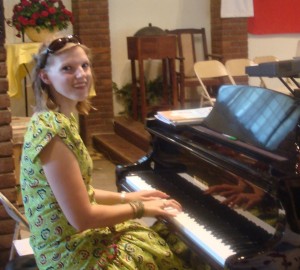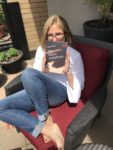Guest Post: Sara Zanussi, A Tanzanian Adventure
 In this post we adventure vicariously with Sara Zanussi. Sara is just back from a year spent teaching piano and music in Arusha Tanzania. When I asked her how she became involved in the project she said, “honestly the short answer is contacts but basically it landed in my lap!”
In this post we adventure vicariously with Sara Zanussi. Sara is just back from a year spent teaching piano and music in Arusha Tanzania. When I asked her how she became involved in the project she said, “honestly the short answer is contacts but basically it landed in my lap!”
Sara Zanussi is the founder and teacher at Z’s Keys where she has been teaching and accompanying for eight years. She graduated from Luther College with a BA in Music, a concentration in International Business, and a minor in Spanish. She speaks Spanish, Swahili, and some Italian. She hopes to pursue a masters degree in International Development and work for youth arts development programs. Currently, she resides in the Twin Cities and in her free time enjoys being outdoors and a good book
To celebrate my one month of being back in the ol’ USA, I would like to share some reflections on teaching music in Tanzania this past year with the Umoja Arts Project. My experience in Arusha cannot be summed in one blog entry. You might try to sum it up by reading my whole blog at swzanussi.blogspot.com, but quite honestly even those are mere glimpses.
Blog Excerpt 5/28/11
I just heard the saddest thing. On our way to Umoja Ensemble today, we saw one of the boys at home and figured he must just be sick or have to help out with family duties. We asked the other kids in the ensemble what was wrong with Yusto. It turns out his father is prohibiting him to do Umoja Ensemble because he was sent to that school to be someone, “not a f%^&’in musician!” This saddens me so greatly because little does that father realize how important music can be into developing somebody into someone. This is the kid that shows us every week what step or drum pattern he has practiced (Dad, this was the one that was obsessed with your iPhone). I want our Tanzanian teacher to go talk to his parents, but know it needs to come from the school. Our only hope is that his test results don’t diminish so that he can see it’s not because of UE that his concentration is not there and he doesn’t like math. In fact, all the Umoja outreach kids are at the top of their classes. I looked today and saw all the kids at the top with one even having scores of 100, 94, and 91, with the lowest being 85. I’ve seen these kids transform from shy, giggling children to children who have self-confidence, a purpose, and are proud to be part of something. It breaks my heart that this boy can’t and that his father can’t see that. Sadly, I know this is the mindset of many parents, not only in Africa. Music is something you can do later. But do they know it is the only activity that stimulates both sides of the brain? That children who can play an instrument do better in school and have better concentration, not worse? Better coordination and most importantly are able to express themselves.
My biggest professional accomplishment was teaching a full studio for the first time with 7 voice students and 31 piano students! This included teaching three Tanzanian outreach students whose second language was English. Aside from language (even when I taught in Swahili), certain cultural differences in behavior were present. When I asked if they understood, they would nod. But soon I realized this was a Tanzanian way of being polite and they would nod regardless of whether they understood.
Tanzanians very rarely articulate confusion or ask questions; even adult Tanzanians wouldn’t suggest things to me. This created difficulty during lessons when I thought they had understood and they really hadn’t. One way to remedy the situation was to ask them what they didn’t understand. I realized that in itself was difficult because it wasn’t until the end of the year that they could articulate the problem. This encouraged them to ask questions and I’d spend the last five minutes asking them what they were supposed to practice for the following week. Regardless of me writing in a notebook in Swahili, there was a lack of responsibility for taking initiative in what to practice, even if they loved piano.
It was also challenging because Tanzanian children go to school six days a week and furthermore most use keyboards to practice which require electricity. Tanzania has power cuts on a weekly if not daily basis so this created an additional challenge to practicing. When I was leaving, they had me over for dinner and I was amazed how thankful they were. They made me very sweet cards and gave me a very unusually large piece of fabric (a common gift) showing their gratitude.
My favorite part was Umoja Ensemble, selected students from Tanzanian primary schools, and teaching them African lullabies, dance, and traditional drum patterns. This ensemble gave me a new appreciation and passion for the importance of the arts in youth. It’s amazing to see the progress children can make in a short time. Whoever says the arts is a waste of time or one of the first things that should be cut needs to understand music isn’t just about learning music. It develops individuality, expression, self-confidence, and the ability to ask questions as I saw demonstrated in these children. Not to mention it is one of the only activities that uses both sides of the brain simultaneously.
Blog excerpt 10/31/10
So yesterday we had an outreach concert at a place called the Plaster House where kids are recovering after burns or injuries involving casts (hence the name). The turnout was incredible. While there was definitely room for improvement in terms of organization and what not, the music itself was incredible. Sure, some was ability, but it was more the idea that outreach students (Tanzanians) and the wealthiest expats were not only in one room, but supporting each other, listening to everyone’s accomplishments. The most powerful was at the end when all the instruments and voices, regardless of who, joined together in singing the national anthem. Perhaps, I come across as race-heavy, but here, the disparity between wazungu (white people) and Tanzanians is so vast and it is VERY rare that they mingle. While we weren’t quite to the point of mingling, they were playing something that universally everyone can appreciate: the gift of music. Music transcends language. It doesn’t matter if the words are understood . A familiar melody of music is a bridge between any culture.
I also had a unique experience of being a music teacher mentor at the School of St. Jude’s, which required facilitating and teaching music classes for 4th-6th grade. It was amazing to see the progress of both the students and the teachers in six weeks considering at the beginning of the term, students couldn’t identify loud from soft, fast from slow, etc. and were seated by boys on one side and girls on the other. When I saw the warm-up of “dancing” and having girls strut across the room one at a time shaking their hips to a song connoting things that should not be taught in school to 5th graders, I knew this would involve pushing some cultural boundaries. But as a Westerner, I felt very strongly that shouldn’t be encouraged; women have enough trouble as is!
I didn’t do this by telling them what they were doing was wrong, but simply introduced a new curriculum using their integrated primary curriculum where all classes discuss the same topic for a six week period. At the beginning of the term, the teachers didn’t have needed materials ready even after being specifically asked, didn’t ask questions when they didn’t understand, and had very little classroom control. They expected the kids to work without direction. However, by week six, the teachers were asking questions when they didn’t understand what I had asked them to do, they came up with their own activities, and the students had mastered not only identifying these concepts, but also able to follow a conductor, recognize and clap rhythms, sing solfegge, and work together in coed groups.
Another learning experience was directing a community choir of 95% people who didn’t know how to read music. Learning how to describe concepts like crescendo and how a half note was different than an eighth note was certainly a challenge. Yet, by the end of the year, they were able to sing three part harmony and hold their parts with a piano accompaniment. It was very difficult to get people to commit and there were many rehearsals when we only had three people. Yet those that attended regularly were so determined and I didn’t have the heart to stop as frustrating as it was. A skill that I learned from them is their amazing aural skills. Even though they didn’t know how to read music, if I gave them the words and sang the tune for them they could match it on the first time.
I was also part of an African ensemble at Makumira University that included drumming, dancing, singing. Each student was required to teach a song from his/her ethnicity (there are over 150 tribes in Tanzania) to the rest of the class. This reinforced how dominant aural learning is there. Even though the students had not heard the songs before and did not have the music in front of them, they were able to sing the song the first time around, soon after adding dancing. In fact, this was the first year the students were required to write down the notation, significance and instrumentation of the song and turn it in as a homework assignment.
And now if someone asks me ‘How was Tanzania?’, I can say an educative experience
Sara taught some of her Umoja students via Skype when they traveled. Check out more about teaching via Skype (including in Africa and Germany) here


